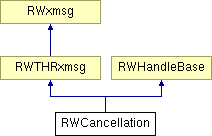
SourcePro C++ 12.0
SourcePro® C++ API Reference Guide
SourcePro C++
Documentation Home
 SourcePro C++ 12.0 |
SourcePro® C++ API Reference Guide |
SourcePro C++ Documentation Home |
Represents an exception that is thrown to cancel a thread. More...
#include <rw/thread/RWCancellation.h>

Public Member Functions | |
| virtual void | raise (void) const |
| virtual RWTHRxmsg * | clone (void) const |
| RWCancellation (RWRunnableImp *runnableImpP) | |
| RWCancellation (const RWCancellation &second) | |
Protected Member Functions | |
| RWCancellationImp & | body (void) const |
RWCancellation is an exception that is thrown to cancel a thread. It may be caught by the thread in order to clean up resources or perform final shutdown operations. Thread cancellation allows an application to stop a thread at a safe point in its execution. Thread cancellation is especially useful for stopping threads that are executing in infinite loops.
A thread is cancelled when an external thread calls requestCancellation() on the RWRunnable object. The thread cancellation starts when RWRunnableSelf::serviceCancellation() is called from within the cancelled thread. If cancellation has been requested on that thread via RWRunnable::requestCancellation(), then an RWCancellation exception is thrown out of RWRunnableSelf::serviceCancellation().
RWRunnableSelf::serviceCancellation() is also called implicitly from within the acquire() or wait() methods of a synchronization object, when that synchronization object has been initialized with RW_CANCELLATION_ENABLED. The global function called rwServiceCancellation() may also be used as a substitute for RWRunnableSelf::serviceCancellation() member function.
#include <rw/thread/RWThreadFunction.h> // for RWThreadFunction #include <rw/thread/RWRunnableSelf.h> // for ::rwThread() and // ::rwSleep #include <rw/thread/RWCancellation.h> // for RWCancellation #include <rw/sync/RWMutexLock.h> // for RWMutexLock RWMutexLock cancelEnabledMutex(RW_CANCELLATION_ENABLED); void func(void) { RWRunnableSelf currentRunnable = ::rwRunnable(); try { while (1) { // Check to see if cancellation has been requested. // If it has, then an RWCancellation exception // will be thrown. currentRunnable.serviceCancellation(); // - OR - cancelEnabledMutex.acquire(); // - OR - rwServiceCancellation(); // ... } } catch (RWCancellation&) { // thread canceled, do any necessary clean up throw; // rethrow } } main() { RWThread t = rwtMakeThreadFunction(func); t.start(); ::rwSleep(100); // wait 100 milliseconds t.requestCancellation(); return 0; }
| RWCancellation::RWCancellation | ( | RWRunnableImp * | runnableImpP | ) |
Constructs a cancellation instance that is targeted at the specified runnable.
| RWCancellation::RWCancellation | ( | const RWCancellation & | second | ) | [inline] |
Copy constructor. Required for exception propagation.
| RWCancellationImp& RWCancellation::body | ( | void | ) | const [protected] |
Gets a reference for the body instance, if any.
| RWTHRInvalidPointer | Thrown if this handle is not attached to a body. |
Reimplemented from RWHandleBase.
| virtual RWTHRxmsg* RWCancellation::clone | ( | void | ) | const [virtual] |
Calls the copy constructor of the runtime (derived) type of self and returns the result.
Reimplemented from RWTHRxmsg.
| virtual void RWCancellation::raise | ( | void | ) | const [virtual] |
Throws an exception of the runtime (derived) type of self.
Reimplemented from RWTHRxmsg.
© Copyright Rogue Wave Software, Inc. All Rights Reserved.
Rogue Wave and SourcePro are registered trademarks of Rogue Wave Software, Inc. in the United States and other countries. All other trademarks are the property of their respective owners.
Contact Rogue Wave about documentation or support issues.